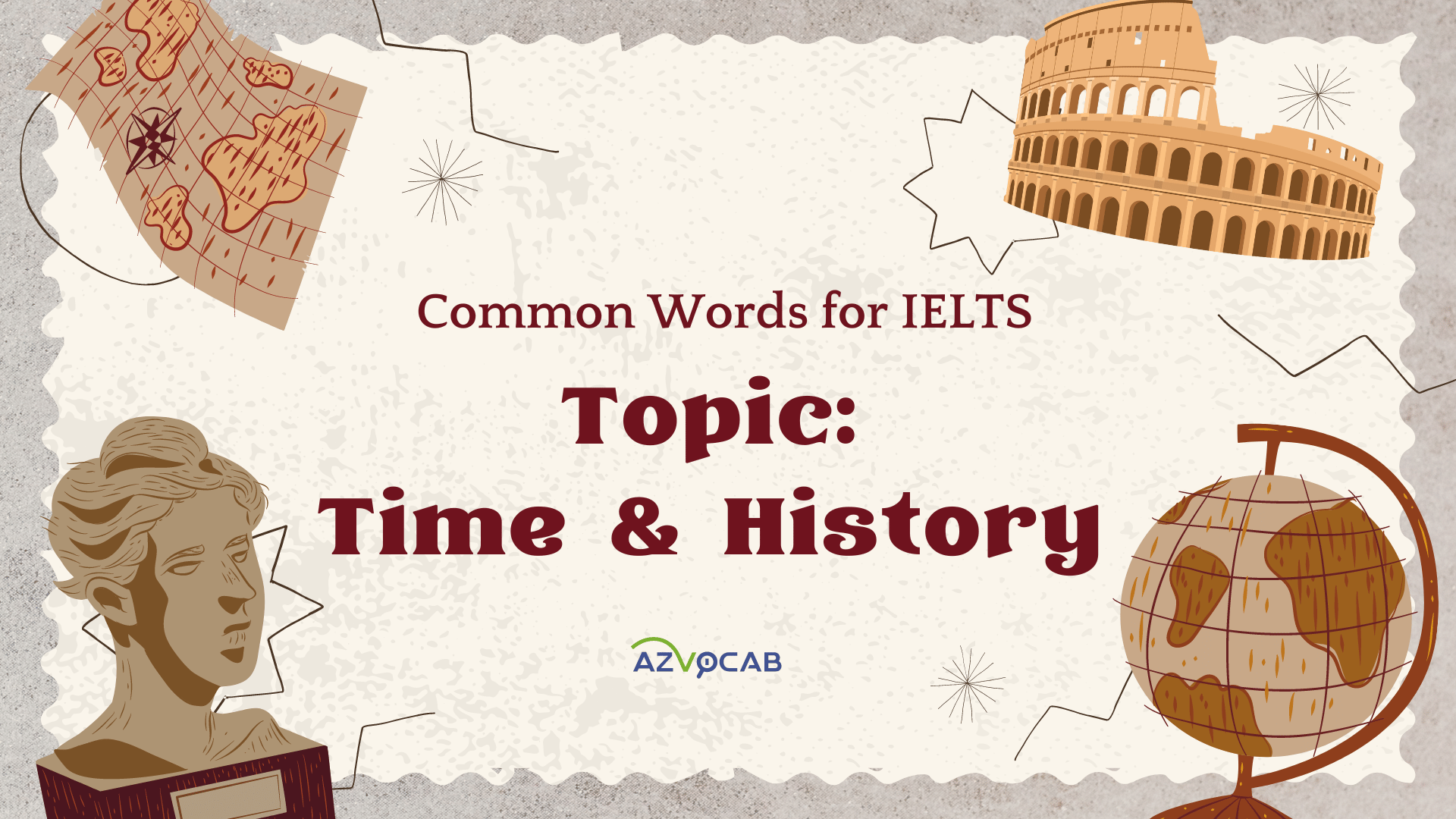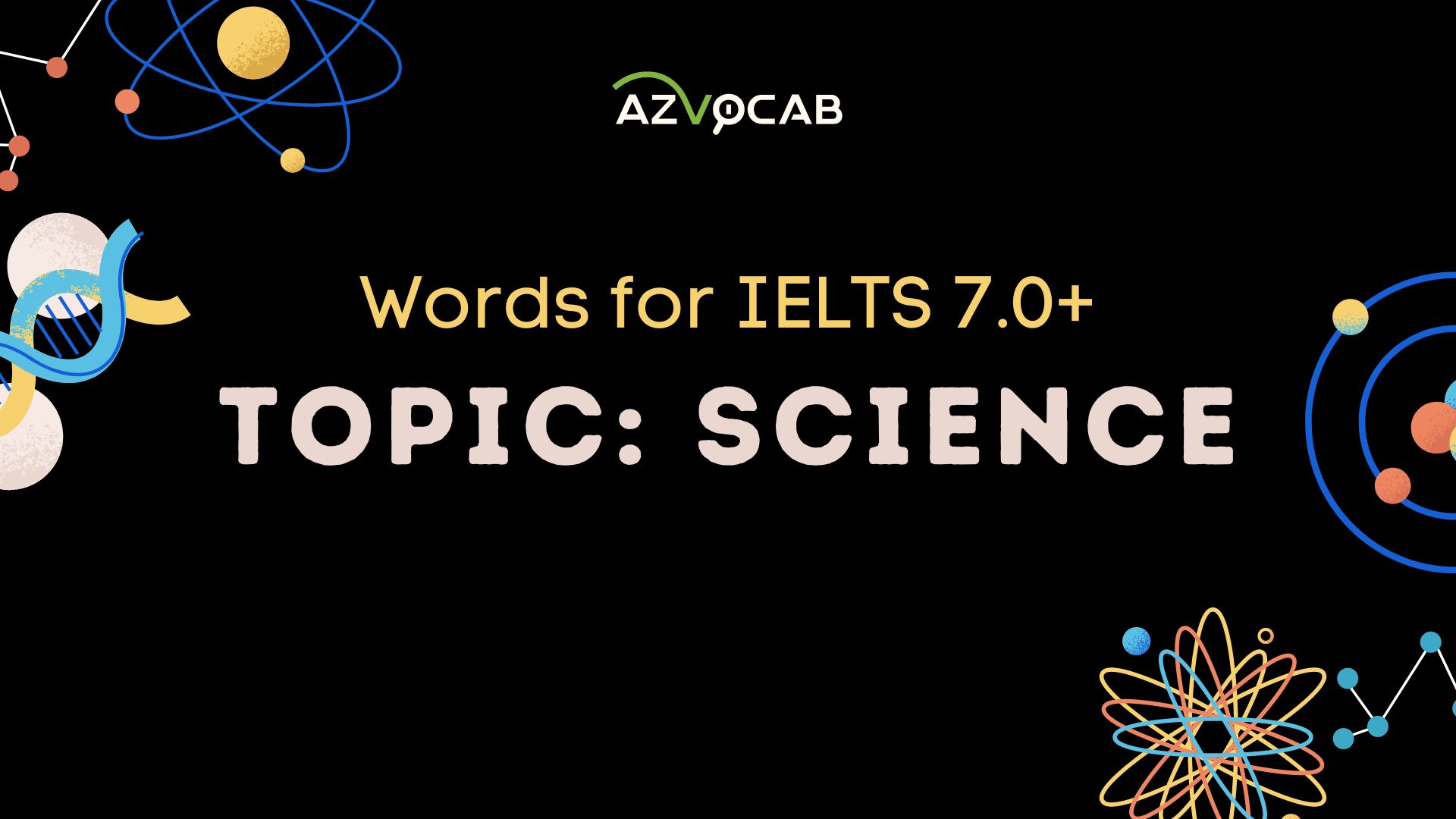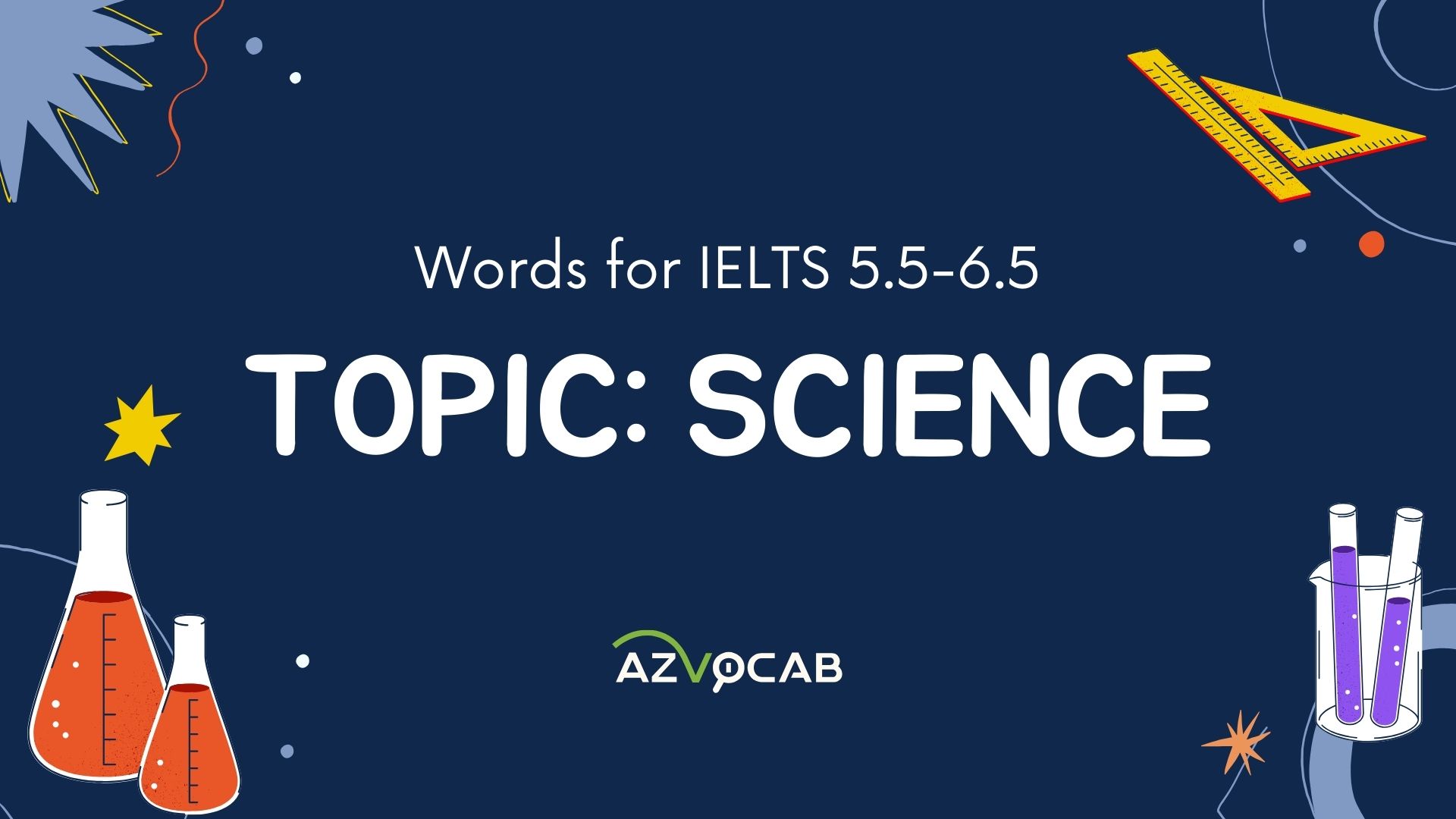Compilation of Common Words Topic Time and History for the IELTS exam
30 August, 2023Common words for IELTS

azVocab has compiled over 30 common words on the topic of “Time and History” for the IELTS exam. These vocabulary words can be used in all four sections of four skills: Reading, Listening, Speaking, and Writing. azVocab has carefully selected examples that fit specific contexts in IELTS exams. This will help you understand how to use these words in context, increasing the effectiveness of your vocabulary learning.
1. Vocabulary about time
| age (n.) – a particular period in time | These first artifacts were just wooden poles which have long gone, but these were raised by men in times so ancient that Britain was still recovering from the Ice Age. |
| century (n.) – a period of 100 years | These yards sprang up either in or around many major cities in the nineteenth century but were particularly characteristic of London. |
| decade (n.) – a period of ten years, especially a period such as 2010 to 2019 | One 2002 study found that animal numbers had dropped by between 20 and 30 percent in a single decade. |
| era (n.) – a period of time of which particular events or stages of development are typical | Stones began to arrive in this era and the circular shape and pattern of these enormous stones, which predate all other known structures, are still standing today. |
| generation (n.) – all the people of about the same age within a society or within a particular family | If we consider only the ancient stones themselves, the work spanned seventy generations — some 1,600 years. |
| millennium (n.) – a period of 1,000 years, or the time when a period of 1,000 years ends | Many Visitors to Stonehenge fail to notice the ‘henge’ since the ditch and bank have been greatly eroded over the passing millennia. |
| timeline (n.) – a line that shows the time and the order in which events have happened | The timeline shows this history, with a frenzy of activity from just before 3000 BC through to 1600 BC being responsible for most of what we now gaze upon in awe. |
| trend (n.) – a general development or change in a situation or in the way that people are behaving | Companies offering products with healthy ingredients have set the trend in recent years. |
| bygone (adj.) – belonging to or happening in a past time | The exhibition contains faded photographs reminding us of a bygone era. |
| chronological (adj.) – following the order in which a series of events happened | You should organize the dates into chronological order from the oldest to the most recent. |
| consecutive (adj.) – consecutive events, numbers, etc. follow one after another without an interruption | It would be better if the meetings were on consecutive days. We’d get more done that way. |
| imminent (adj.) – coming or likely to happen very soon | From government ministers to rice farmers, every Bhutanese you speak with will declare that his country is in constant, imminent peril. |
| middle-aged (adj.) – in middle age | They’re a middle-aged couple, with grown-up children. |
| preceding (adj.) – existing or happening before someone or something | There was a great deal of excitement in the days preceding the election. |
| prior (to) (adj.) – before a particular time or event | Prior to the introduction of the steam engine, most people in the UK worked from home. |
| punctual (adj.) – arriving, doing something, or happening at the expected, correct time; not late | I can’t say I’m very punctual. I do my best not to be late because I hate being kept waiting for myself, but I do sometimes spend too much time getting ready. |
| rapid (adj.) – fast or sudden | Given the rapid growth of our population, there is a need to improve our infrastructure. |
| time-consuming (adj.) – a time-consuming task takes a lot of time to do | If I’m going out somewhere, I like to plait my hair, which is very thick so this can be very time-consuming and I often have to rush through everything else I need to do. |
| chronologically (adv.) – in a way that follows the order in which a series of events happened | If we consider the structure chronologically, we can see that construction took place in several phases over more than a thousand years. |
| formerly (adv.) – in the past | Istanbul was formerly known as Constantinople. |
| periodically (adv.) – in a way that is repeated after a particular period of time | After you’ve planted your seeds you can’t simply leave them to grow, they do need to be checked periodically for weeds and pests. |
| previously (adv.) – before the present time or the time referred to | Three years previously the government had introduced a new law allowing women to vote for the first time. |
| subsequently (adv.) – after something else | Twenty people were injured in the accident and the tower was subsequently demolished to prevent it from happening again. |
2. Vocabulary about history
| archaeologist (n.) – someone who studies the buildings, graves, tools, and other objects of people who lived in the past | I’ve been working with a group of archaeologists who gather evidence of those prehistoric lakeside dwellers. |
| excavation (n.) – the act of removing earth that is covering very old objects buried in the ground in order to discover things about the past | These may have served as markers for astronomical measurement. We do not know if there are more of them as the excavation did not cover a large area. |
| find (n.) – a good or valuable thing or a special person that has been discovered but was not known about before | A recent find of ancient artifacts is on display at the local museum. |
| pioneer (n.) – a person who goes to an area and builds a house, begins a farm, etc. | They were the pioneers of the colonial era and felt they had discovered the charms of this lake. |
| remnant (n.) – a small piece or amount of something that is left from a larger original piece or amount | In some areas, we’ve found remnants of ancient villages buried beneath deep layers of sediment. |
| in retrospect (phr.) – thinking now about something in the past | In retrospect, and with the benefit of hindsight, it is clear that this was a bad decision. |
| status quo (n.) – the present situation | There will always be people who resist change and want to maintain the status quo. |
| abrupt (adj.) – sudden and unexpected, and often unpleasant | The stock market crash led to a very abrupt reversal in fortunes for many people. |
| ancient (adj.) – of or from a long time ago, having lasted for a very long time | Pablo Picasso got the idea for one of his paintings from an ancient work of art from Africa. |
| fleeting (adj.) – short or quick | I think that, when you get near the end of it, your life must seem brief and fleeting. |
| historical (adj.) – connected with studying or representing things from the past | Several important historical monuments are showing signs of damage because of the thoughtless acts of tourists. |
| immense (adj.) – extremely large in size or degree | Professor Ng said the cost of analysing all the possible interactions and effects of any compound mixture would be immense. |
| minuscule (adj.) – extremely small | The complexity of history puts us in a position of having knowledge of only a minuscule portion of the consequences of any event, actual or proposed. |
| nostalgic (adj.) – feeling happy and also slightly sad when you think about things that happened in the past | Talking about our old family holidays has made me feel nostalgic. |
| pivotal (adj.) – central and important | The elections may prove to be pivotal in Colombia’s political history. |
| prehistoric (adj.) – describing the period before there were written records | Prehistoric people probably used plants like sumac and bedstraw as dyes. |
| profound (adj.) – showing a clear and deep understanding of serious matters | National advertising of branded goods emerged in this period in response to profound changes in the business environment. |
| topical (adj.) – of interest at the present time; relating to things that are happening at present | I prefer this newspaper because it covers the most topical news stories. |
| turbulent (adj.) – involving a lot of sudden changes, arguments, or violence | This has been a turbulent period involving a great deal of struggle and hardship. But it is a necessary part of our revolution. |
| erode (v.) – to rub or be rubbed away gradually | Many visitors to Stonehenge fail to notice the ‘henge’ since the ditch and bank have been greatly eroded over the passing millennia. |
| excavate (v.) – to remove earth that is covering very old objects buried in the ground in order to discover things about the past | To help with our research, we aim to fully excavate the sites. |
| infer (v.) – to form an opinion or guess that something is true because of the information that you have | Such information, combined with other evidence, enables researchers to infer the technological skills of ancient civilisations and the cultural importance of their textiles. |
| predate (v.) – to have existed or happened before another thing | Stones began to arrive in this era and the circular shape and pattern of these enormous stones, which predate all other known structures, are still standing today. |
With the common words provided here, we hope you can better prepare for your upcoming IELTS exam. Wishing you success in conquering the IELTS, and feel free to explore more useful articles compiling common vocabulary for the IELTS exam on azVocab!
ielts
ielts vocabulary
3663
Share





